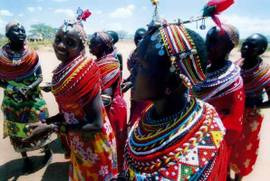 |
 |
 |
| |
|
|
|
|
|
WOMEN
ON TOP
WOMEN DO NOT
NEED MEN

Marie Claire Reports: Women On Top
They are more successful in a matriarchal setting where men are hired for labor and services. Rasa new it all the time - this is proof.
Submitted by William Bond
WOMEN ON TOP

These Kenyan women suffered years of rape and violence
at the hands of locals — even the British Army are allegedly culpable.
Finally, the women upped ship and left town. Now, they see men for sex, hire
them for hard labour and enjoy a women-only lifestyle in a village that is
a socio-economic miracle.
The sign leading to the women-only village of Umoja stands on a patch of dust in remote northern Kenya. There is little on the horizon but empty scrub, yet the sign looks like it's in a war zone – it's been battered with stones, gouged with spears and the words 'cultural village' have been blacked out. Margaret Ejejo, 27, rubs her hand over the pockmarked surface and lets out a big, gap-toothed laugh. 'The local men have done this. They are jealous of our success,' she exclaims. 'We're happy and independent, and they don't like it.'
Inside its circular thorn fence, Umoja is lovingly kept. The earth is swept clean around mud huts and bright tribal jewellery is laid out on mats in a lean-to shop. The villagers consist of 48 women and 31 children – girls and boys. There are no adult men. In 1990, a few women established a man-free zone in Umoja – which means 'unity' in Swahili – after they fled abusive husbands or were ostracised after being raped. Many of the traditionally minded men scoffed that the women would fail and 'get eaten by lions'. But the village has flourished. Today, it has a shop, school, hospital fund, campsite and prized herds of cattle and goats.
Margaret moved to Umoja, in a burning hot valley 200 miles north of the Kenyan capital Nairobi, four years ago with her small daughter and baby son. 'I was the youngest of my husband's four wives,' she says. 'He beat me to make me have sex with him and do more chores, so I ran away. Then my family banished me, because I'd shamed them.' Margaret and the other village women belong to the Samburu, a polygamous warrior tribe closely related to the more famous Masai.
'Life's better here,' adds Margaret, who is now one of the village leaders. 'While I was married, I was very thin. Recently, I saw my ex-husband in town and he cursed me because I'm fat and healthy – he could see I was doing well in Umoja.'
Rural tribes like the Samburu suffer the highest poverty in Kenya, with little paid work and vulnerability to drought and disease. Determined to be self-sufficient, the Umoja women earn money by making and selling tribal necklaces and bangles, as well as operating a campsite. They also perform traditional dancing for tourists visiting the nearby Samburu safari park, charging 200 shillings (£1.50) per person.
The village is revolutionary. In Samburu culture, male elders are revered, and young warriors, or moran, are idolised as gods. 'There is a Samburu saying that “men are the head and women are the neck” – so men are on top,' says Margaret wryly. Still, she says they do not oppose Samburu tradition in general. 'We love our culture, and we don't hate men. The idea of Umoja is to give women the freedom to control their own lives. That couldn't happen if we allowed men to live here, because everyone would slip back into the old ways of male rule.'
Today, the Umoja women employ men for cash to do these tasks for them. They also hire warriors to perform courtship dances and love songs with the women for tourists. 'There are always men around the village, but we are their bosses and they leave at night,' says female elder Sepeyan. The women also employ a male guard to protect them from outraged locals. 'Some men call us “evil donkeys” and claim we're sorceresses who use magic to succeed. They can't believe we can exist without them,' tuts Margaret. On a few occasions, gangs of men have stormed the village, attacking the women with sticks and sabotaging property. 'The last time it happened, we caught one man and beat him with his own club,' she adds.
Despite this battle of the sexes, the Umoja women are still open to relationships with men. Boyfriends are allowed, but the women meet them outside the village, and come and go on their own terms. 'Of course we're human, and sometimes we want a man physically,' laughs Sepeyan. 'But we don't let boyfriends get in the way of village life.' Sepeyan claims she is too old for sex, but she still has romantic desires. 'When I see the young warriors dancing, they remind me of past boyfriends,' she says. 'Sometimes, I invite them to my hut for tea after the performance, but they see the look in my eye and they run away fast,' she says, roaring with laughter.
To meet more of the amazing women of Umoja, buy the June issue, out 4 May.
Rasa
Von Werder March 3, 2006 |
THANKS TO WILLIAM
BOND FOR TYPING OUT THIS ENTIRE
ARTICLE FROM MARIE CLAIRE
WOMEN
ON TOP
By Abigail Haworth.
These Kenyan women suffered years of rape and violence at the hands of locals - even the British army are allegedly culpable. Finally, the women upped ship and left town. Now, they see men for sex, hire them for hard labour and enjoy a women-only lifestyle in a village that is a socio-economic miracle.
The sign leading to the women-only village of Umoja stands on a patch of dust
in remote northern Kenya. There is little on the horizon but empty scrub, yet
the sign looks like it's in a war zone - it's been battered with stones, gouged
with spears and the words 'cultural village' have been blacked out. Margaret
Ejejo, 27, rubs her hand over the pockmarked surface and lets out a big, gap-toothed
laugh. 'The local men have done this. They are jealous of our success,' she
exclaims. 'We're happy and independent, and they don't like it.'
Inside its circular thorn fence, Umoja is lovingly kept. The earth is swept clean around mud huts and bright tribal jewellery is laid out on mats in a lean-to shop. The villagers consist of 48 women and 31 children - girls and boys. There are no adult men. In 1990, a few women established a man- free zone in Umoja - which means 'unity' in Swahili - after they fled abusive husbands or were ostracised after being raped. Many of the traditionally minded men scoffed that the women would fail and 'get eaten by lions'. But the village has flourished. Today, it has a shop, school, hospital fund, campsite and prized herds of cattle and goats.
Margaret moved to Umoja, in a burning hot valley 200 miles north of the Kenyan capital Nairobi, four years ago with her small daughter and baby son. 'I was the youngest of my husband's four wives,' she says. 'He beat me to make me have sex with him and do more chores, so I ran away. Then my family banished me, because I'd shamed them.' Margaret and the other village women belong to the Samburu, a polygamous warrior tribe closely related to the more famous Masai.
'Life's better here,' adds Margaret, who is now one of the village leaders. 'While I was married, I was very thin. Recently, I saw my ex- husband in town and he cursed me because I'm fat and healthy -
'My husband paid ten cows and 20 goats to marry me. I was 12 and he was over 50' he could see I was doing well in Umoja.' Rural tribes like the Samburu suffer the highest poverty in Kenya, with little paid work and vulnerability to drought and disease. Determined to be self-sufficient, the Umoja women earn money by making and selling tribal necklaces and bangles, as well as operating a campsite. They also perform traditional dancing for tourists visiting the nearby Samburu safari park, charging 200 shillings (£1.50) per person.
The key to Umoja's success is financial management. 'We don't waste our money. We share out a small amount for food and necessities and save the rest,' says Margaret. Unheard of in most tribal areas, the women have their own joint account. 'We use our savings to invest in our businesses and livestock, so we can pay for healthcare and our children's schooling.'
The village is revolutionary. In Samburu culture, male elders are revered, and young warriors, or moran, are idolised as gods. 'There is a Samburu saying that "men are the head and women are the neck" - so men are on top,' says Margaret wryly. Every Samburu village has a thorn- fenced 'parliament' where all decisions are made, and females are not allowed in. Girls become brides at puberty, often betrothed to older men who pay a high bride price. 'My husband paid my father ten cows and 20 goats to marry me when I was 12 and he was over 50. I wasn't told about the wedding.' Margaret only realised her fate the day before, when some female elders took her into the bush to subject her to genital mutilation, a premarital ritual that, in this part of Kenya, entails removing the clitoris with a razor or piece of sharpened metal. 'It was agony. They told me to sit in the river to numb my private parts, but it didn't stop the pain.' Genital mutilation, also known as female circumcision, is banned in Kenya, but the practice thrives among rural tribes, who believe it helps to ensure a wife's fidelity. Over 80 per cent of Samburu brides are mutilated in this way. Large numbers die from blood loss or infections, while others have crippling health problems.
The women
of Umoja campaign against the practice, which angers tribal men even more. 'We
visit other Samburu villages to warn women of the dangers and explain it is
their legal right to refuse,' says
Margaret. 'Sometimes, the men try to chase us away, but we won't give up.' The
women also campaign against rape and domestic violence. 'Men believe wives are
their property and it's their right
to beat them,' she adds.
One village woman, Tikako Lalamba, 40, says her husband hit her daily for 15 years. 'I finally left him because I was having trouble walking.' Tikako was also forced to watch while her sister was the victim of male mob justice that, she says, is regularly used against 'disobedient' wives. 'My sister refused to sleep with her husband, so he called a meeting with the village men to punish her. About ten of them caught, beat and held her down while her husband publicly raped her. She almost died,' Tikako recalls tearfully.
Much like a refuge, many women came to Umoja because they were raped and then cast out by their husbands. While some were attacked by fellow tribesmen, a handful of Umoja's residents, including Tikako, are among about 650 Samburu and Masai women involved in a shocking rape case against the British Army. The tribeswomen, from all over northern Kenya, say they were raped during the Eighties and Nineties by Army personnel stationed in the area. `About ten years ago I was in a field when two British soldiers arrived. One of them caught me and raped me, like it was sport.' The women are suing the Army for compensation, and the allegations are still being investigated.
With the Army's internal enquiry in its final stages, the military was unwilling to speculate on the outcome, but a senior source has already gone on the record saying it will close without any soldiers being charged. The Sunday Telegraph has also reported that the Army investigators had interviewed 2,000 women and concluded that, 'The majority of the allegations were fabricated by tribespeople hoping for compensation from the British government.' Amnesty International says, 'The investigation is not enough. It is not acceptable, when such serious allegations have been made, for the Army to investigate itself. There should be an independent enquiry without delay.'
Meanwhile,
the Kenyan government has proposed tougher laws on domestic violence and rape,
declaring such crimes as 'the greatest human rights issue in the country'. But
for Umoja women, legal measures are not enough. 'We must change our culture
from within by standing up to male bullies,' explains Margaret. Still, she says
they do not oppose Samburu tradition in general. 'We love our culture, and we
don't hate men. The idea of Umoja is to give women the freedom to control their
own
lives. That wouldn't happen if we allowed men to live here, because everyone
would slip back into the old ways of male rule.'
The Umoja,
village was started from nothing. Sepeyan Leadismo, a statuesque woman who guesses
she's about 45, was one of the 15 founding members. `All we had was a dry patch
of earth. We built our own huts and had no food except weak porridge. It was
a struggle,' recalls Sepeyan, sitting under a acacia tree. Unable to afford
glass beads, the women started making woven bangles from dried palm leaves and
necklaces from seeds. `We stood on the roadside to sell the jewellery to tourist
buses on their way to the safari park,' she says. `We almost starved ourselves
until we saved enough to buy our
first cows and goats and start a proper village.' (Milk and blood from livestock
are the Samburu people's staple foods.)
As Umoja prospered, the residence brazenly reversed gender roles. Samburu women are the workhorses of in traditional villages, often walking up to 40 miles a day to fetch firewood and water, or to graze animals. Today, the Umoja women employ men for cash to do these tasks for them. They also hire warriors to perform courtship dances and love songs with the women tourists. `there are always men around the village, but we are their bosses and they leave at night,' says Sepeyan.
The women also employ a male guard to protect them from outraged locals. `Some men call us "evil donkeys" and claim we're sorceresses who use magic to succeed. They can't believe we can exist without them,' tuts Margaret. On a few occasions, gangs of men have stormed the village, attacking the women with sticks and sabotaging property. `The last time it happened, we caught one man and beat him with his own club,' she adds.
If imitation is the sincerest form of flattery, Margaret could be right. A few years ago a group of divorced men set up a rival men's village less than a mile up the road. The men planned to earn cash by staging tribal dancing and fire making displays. The village still exists but its huts are disintegrating, empty bottles of home-made hooch litter the ground and a thick air of despondency hangs over its 12 residents.
`Nobody comes here or helps us.' Says Francis Learpora, 50, the village chief, who admits he has taken part in attempts to destroy Umoja. `The ladies steal all our customers. They have no rights to have their own village. They should be stopped.' He also fumes about Kenya's proposed new laws to protect women. `We pay for our wives with cattle, so we should be able to have sex with them whenever we like.'
Despite this battle of the sexes, the Umoja women are still open to relationships with men. Boy friends are allowed, but the women meet them outside the village, and come and go on their own terms. `Of course we're human, and sometimes we want a man physically,' laughs female elder Sepeyan. `But we don't let boyfriends get in the way of village life.'
Sepeyan claims she is too old for sex, but she still has romantic desires. `When I see the young warriors dancing, they remind me of my past boyfriends,' she says. `Sometimes, I invite them to my hut for tea after he performance, but they see the look in my eye and they run away fast,' she says, roaring with laughter.
The younger women, have better luck. Nchekiyo Lembwakita, 16, and her friend Macdeli Lalamba, 18, will not mention their boyfriends in Umoja, since it is Disrespectful to chat about sex in front of their elders, In the afternoon, they put on their finery and wander into Archer's Post, the nearest town, which has one fly blown street with rickety shop and pubs.
`My boy friend is a warrior. He's tall and handsome,' confides Nchekiyo, swigging orange Fanta in a tin-roofed café. She met him at a dance organised by young warriors who, after they reach moran status aged about 18, mostly spend their time raiding cattle and womanising. `The men bring red beads to the dances to give to the girls they like,' she says, `If you accept the beads, you become their girlfriends.'
Macdeli, who is the daughter of abuse victim Tikako, is also dating a warrior. `I see him in secret, as my mother wouldn't approve.' She says the relationship is purely sexual. `We have to hide in the bush, so there is no time to talk. We just have sex and leave.' Nchekiyo and Macdeli say they feel empowered by living in Umoja. `We can survive without men, so we won't put up with bad treatment,' say Nchekiyo. `If a boy hits me, I'll reject him.'
Two years ago, Nchekiyo was betrothed to a 60 year old man, but escaped before the wedding, `I knew something was wrong when my father told me not to do work one day,' she says. `So I ran away with my mother to Umoja. Father came after us, but the village women formed a human barricade to keep him out.'
As well as saving her from a force marriage, living in Umoja has enabled Nchekiyo to study for the first time. She is too old for the village school, which has 76 primary pupils, but the women hold evening classes to teach reading and writing to uneducated girls. About 90% of Samburu women are illiterate.
The village also rescued other teens, including a talented schoolgirl who was due to sit her senior exams when her family pulled her out of school to become the fifth wife of a local man. The women spirited her away to Umoja in the middle of the night. They paid for her to finish her exams from the village fund and the girl, now 18, has just gone to university.
The boys who live in Umoja with their mothers also consider themselves lucky. `Women are better leaders,' says Robin Lekopiro, 18. `They take care of everyone and don't drink alcohol or fight.' Since he moved here six years ago. Robin has been happy and has done well at school.
The only downside is taunting by local boys. `They say I am letting down the male sex,' he says. `Once, they tied me up with palm leaves and threw stones at me, but I told them to grow up.' Since he is on the verge of manhood, Robin will soon leave Umoja to comply with the women-only rule. `In our culture, boys must leave home to fend for themselves at my age anyway, so it's not unusual,' he explains.
Playing nearby is Robin's 12-year-old neighbour, Sawadi, an exuberant girl with the face of an angel and the vocal cords of an elephant. If she didn't live in Umoja, Sawadi would likely be married off within a couple of years. Instead she is singing and leaping around, immune to the notion that females are inferior. `Girls are great. We can do anything,' she booms.
What would she be like to be when she's older? Sawadi tilts her head, thinks for a moment and declares mischievously, The Keyan president.' With the formidable Umoja women behind her, that may not be as far-fetched as it sounds.
What's your view on living in a man-free zone like these women? Join us for a debate on the forum at www.marieclarie.co.uk
DISCUSSIONS
ON
 |
 |
 |
| HOME
| UPDATES
| GALLERIES
| FOUNDER
| SHOP
| INTERACT
| JOIN
US! © 2004 - 2006 RASA VON WERDER
|